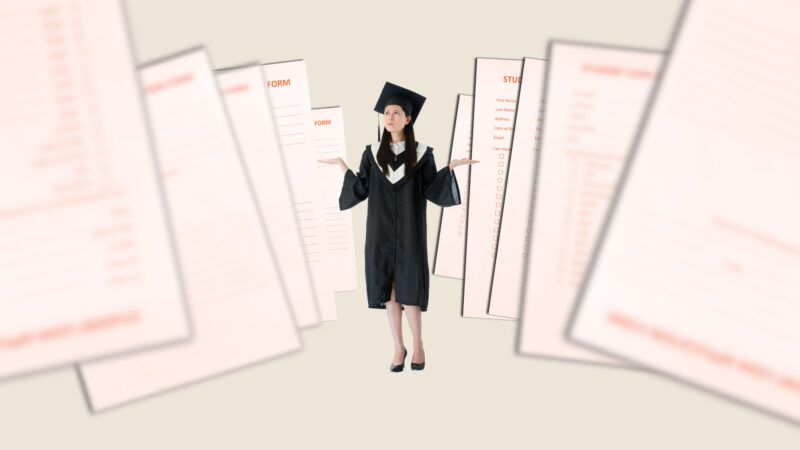Biden Administration Just Announced $6 Billion in Student Loan Forgiveness
The Department of Education continues to forgive federal debt for attendees of shuttered for-profit schools.

The Department of Education last week announced it was canceling $6 billion in student loan debt and issuing refunds for attendees of shuttered for-profit colleges as part of a settlement in a class-action lawsuit.
The plaintiffs in Theresa Sweet v. Miguel Cardona filed for debt relief under the "borrower defense to loan repayment" program. Created by the Obama administration, borrower defense allows the Education Department to forgive the federal student loan debt of students who can show they were defrauded by the school they attended. Under the Trump administration, the Education Department's evaluation of borrower defense applications slowed to a halt. In response, former students of the now-defunct Corinthian Colleges sued Education Secretary Betsy DeVos for "unlawfully withholding or unreasonably delaying action on Plaintiffs' applications." Miguel Cardona, President Joe Biden's education secretary, then became the defendant.
Under the terms of the settlement, the Department of Education will forgive roughly $6 billion in loans for 200,000 attendees of dozens of technical schools and for-profit colleges. The settlement also requires the Department of Education to reimburse borrowers who already made payments or even paid off the entirety of their loans. It is not clear how many borrowers covered by the settlement will receive loan forgiveness for outstanding debt and how many will receive full reimbursement for debt they already repaid. When asked to clarify how many borrowers were in each category, a Department of Education spokesperson said the agency does not comment on ongoing litigation.
Over the past two years, the Biden administration has approved debt forgiveness claims for thousands of former students at for-profit colleges. Earlier this month, the administration announced over $5.8 billion in loan forgiveness to former students of the now-defunct Corinthian Colleges.
However, the Department of Education's role as the largest issuer of student loans in the country means that it continues to fund colleges and universities that fail to prepare students. Low standards for federal funding incentivize the creation of schools whose sole mission is to collect federal loan money. Even for-profit institutions that do serve the majority of their students still put taxpayers on the hook for attendees who can't make the most of their education. Debt forgiveness for all borrowers, including nonprofit private colleges and public institutions, would have the same effect.
If the government wants to prevent vulnerable, low-income people from being defrauded by for-profit colleges, the simplest policy solution would be to get the federal government out of the student loan business altogether. There is clear evidence that "federal student aid fuels the ivory tower's infamous price inflation, including roughly a doubling, in real terms, of sticker prices between the 1991–92 and 2021–22 school years," wrote Neal McCluskey, director of the Cato Institute's Center for Educational Freedom. He continues: "It also makes logical sense: If you give loads of people easy money to pay for one thing, the price of that thing will rise as people demand more of it, and with greater bells and whistles."
Without easily accessible, seemingly bottomless federal student loans, schools—private, public, for-profit, and nonprofit—would need to either charge rates that attendees can pay out of pocket, or prove to private lenders that they offer an education that positions the vast majority of their graduates to repay their debts.
For now, such a solution seems distant. A limit on the annual amount of federal loans was lifted in 1993, and it appears unlikely to return. Meanwhile, calls to cancel federal student loan debt are growing. In the midst of this mess, the Biden administration is focused on symptoms while the underlying disease goes largely unacknowledged.


Show Comments (81)